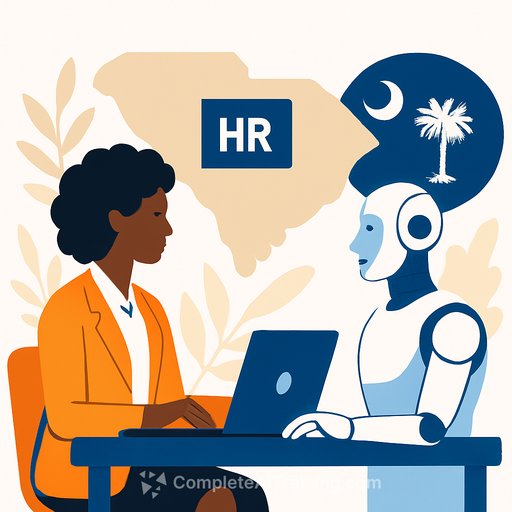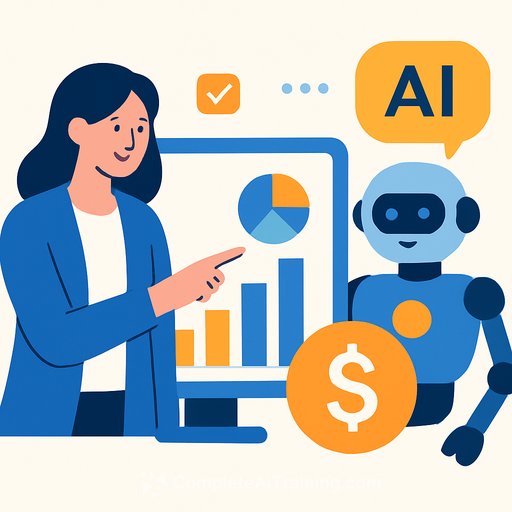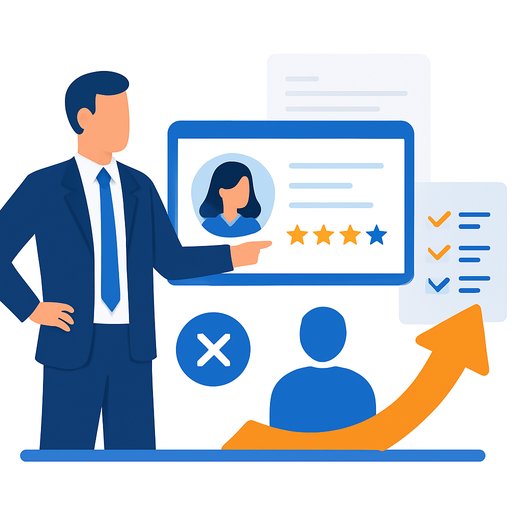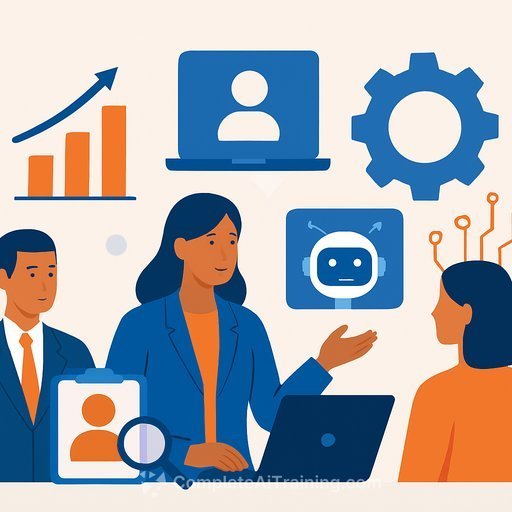Will AI Replace HR Jobs in Columbia? Here’s What to Do in 2025
In 2025, HR professionals in Columbia, South Carolina, face a pivotal moment. With 54% of HR teams already using AI for talent acquisition and 62% for employee engagement, the opportunity to save time and improve outcomes is real. However, successful adoption depends on clear governance, bias audits, candidate notifications, and targeted reskilling.
AI Adoption and What It Means for Columbia HR
AI is increasingly used to streamline repetitive HR tasks like resume screening, interview scheduling, and onboarding. Small businesses in the state lean heavily on AI for recruiting, which means HR teams can reduce screening time by about 7.5 hours per week per practitioner. This freed-up time should be redirected toward retention, leadership development, and improving candidate experience.
However, without proper controls—such as transparency and bias mitigation—these gains risk legal and ethical pitfalls. South Carolina’s 2025 legislation signals stronger requirements around AI use, including mandatory bias audits and candidate disclosures.
Which HR Tasks Are Most Likely to Be Automated?
- First-pass resume screening and applicant tracking
- Automated outreach and interview scheduling
- AI-generated job descriptions
- Chatbot Q&A for candidates
- Standardized onboarding checklists
- Baseline HR analytics
Automating these routine tasks frees HR professionals to focus on higher-value activities like interviewing, diversity audits, and coaching managers.
How AI Changes HR Roles in Columbia
AI shifts HR roles by handling high-volume, rule-based work—resume screening, payroll, benefits administration, and routine onboarding. Recruiters and HR specialists evolve into supervisors of AI tools, focusing on candidate experience design, complex hiring decisions, and compliance oversight.
Key skills gaining importance include data literacy, prompt design, bias auditing, vendor management, and clear candidate communication.
| Automated Tasks | Skills Gaining Importance |
|---|---|
| Resume screening, scheduling, payroll, benefits, onboarding | Data literacy, prompt engineering, bias audits, vendor/tool management, candidate experience |
Legal, Compliance, and Privacy Risks
AI use in HR must be treated as a compliance priority. Federal laws on civil rights and wage-hour apply to automated hiring. Bias audits, transparency, and human oversight are essential to reduce legal risk. Expect increased enforcement and litigation in 2025.
Steps for Columbia employers include:
- Conducting Data Protection Impact Assessments (DPIAs)
- Publishing candidate notices and opt-out options
- Establishing AI governance committees
- Strengthening vendor contracts and data-retention policies
Failing to document AI screening processes can turn a time-saving pilot into a regulatory investigation.
| Immediate Action | Purpose |
|---|---|
| Bias audits / independent impact assessments | Identify disparate impact and meet audit expectations |
| Candidate notification & opt-out options | Increase transparency and reduce legal exposure |
| AI governance committee & DPIA | Establish oversight and risk mitigation |
| Vendor contract & data-retention rules | Ensure compliance and limit data misuse |
Practical 2025 Roadmap for Columbia HR Teams
Start with low-risk AI pilots that build governance. Choose an HRIS system carefully, considering payroll integration and vendor fit. Establish a Center of Excellence (COE) to centralize policies, human review gates, and vendor management. Test AI with simple, documented prompt pilots—such as rewriting PTO policies—to measure impact and employee understanding before expanding.
This sequence—HRIS selection, COE setup, and pilot testing—creates auditable controls that support scaling AI safely.
Advice for Students and Entry-Level Candidates
Job seekers in Columbia should treat resumes like search queries. Mirror the exact job title in your headline and include skills from the posting in your work experience. Use clean, ATS-friendly formats without graphics or tables. Keep a master resume for quick customization and submit text-based PDFs or Word documents.
These simple steps help your resume move from unseen to interview-ready in competitive applicant pools.
Tools, Vendors, and Case Studies
According to the Paychex State of Small Business AI report, 72% of small businesses view AI positively, with 66% reporting productivity gains. HR pilots can reclaim about 7.5 hours per week per practitioner, freeing time for retention, coaching, and DEI initiatives.
Use vendor-neutral tool lists and payroll connector comparisons to select proven recruiting or onboarding copilots. Run short, tracked pilots with clear governance to convert reclaimed hours into measurable improvements.
Measuring Success and Scaling AI
Track key performance indicators (KPIs) that matter:
- Bias detection and correction rates
- Time savings per HR practitioner
- Time-to-fill and cost-per-hire improvements
- Candidate experience scores and escalation rates
Establish a COE that manages dashboards, monthly model-drift checks, and quarterly bias audits. Only scale AI tools after pilots demonstrate fairness, efficiency, and tangible business impact.
| KPI | What to Measure |
|---|---|
| Bias detection & correction rate | % of flagged decisions reviewed and changed by humans |
| Time savings / hours reclaimed | Hours saved per HR practitioner per week, used to calculate ROI |
| Time-to-fill & cost-per-hire | Change vs. baseline after pilot deployment |
| Candidate experience | Survey/NPS scores and escalation rates for AI interactions |
Conclusion: Balance Automation with Human Judgment
AI will automate routine HR tasks but won’t replace HR roles entirely. Columbia HR teams should turn saved administrative hours into coaching, diversity work, and complex decision-making instead of cutting headcount.
Strong governance, clear KPIs, and focused reskilling are key. Treat AI as a tool that amplifies human judgment, not a shortcut. Use human-in-the-loop checkpoints, monitor bias correction, and scale only when audits confirm positive impact. This approach builds trust, improves hiring speed, and boosts retention.
Frequently Asked Questions
Will AI replace HR jobs in Columbia, South Carolina in 2025?AI will automate routine, rule-based HR tasks but won’t fully replace HR jobs. Roles will shift toward supervising AI tools and focusing on coaching, DEI audits, complex hires, and candidate experience.
Which HR tasks in Columbia are most likely to be automated, and what should teams pilot first?Repetitive tasks like resume triage, outreach, scheduling, AI-written job descriptions, chatbot Q&A, onboarding checklists, and basic analytics are prime candidates. Start with low-risk pilots such as documented prompt testing, vendor-neutral HRIS comparisons, and recruiting or onboarding copilots.
What legal, compliance, and privacy risks should South Carolina HR teams prepare for when using AI?Risks include discrimination and privacy violations. Mitigate these with bias audits, candidate notifications, AI governance, and robust vendor contracts.
What skills should Columbia HR professionals and entry-level candidates develop to succeed with AI in 2025?HR pros need data literacy, prompt engineering, bias auditing, vendor management, and candidate-experience design. Entry-level candidates should tailor resumes carefully to job postings and use ATS-friendly formats.
How should Columbia HR measure success and scale AI responsibly?Link pilots to KPIs like bias detection & correction, time savings, time-to-fill, cost-per-hire, and candidate experience. Scale only after pilots show audited fairness and measurable business benefits.
Your membership also unlocks:






